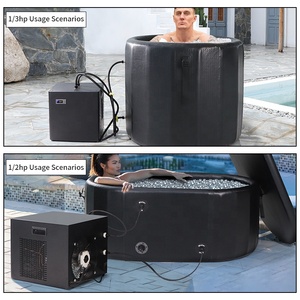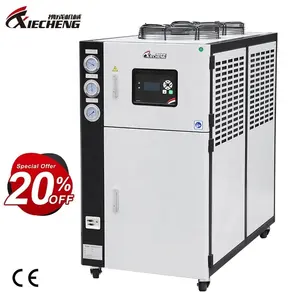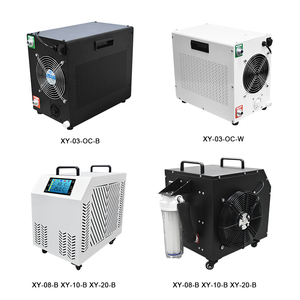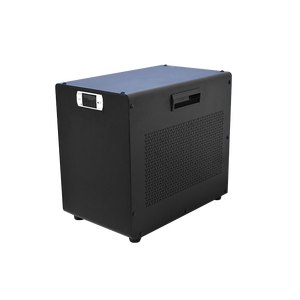(5203 products available)









































































































































































































There are two primary types of 2hp chillers based on their cooling methods: air-cooled and water-cooled chillers.
Air-cooled 2hp chiller
The air-cooled 2hp chiller uses air as the heat-exchange medium to reject heat to the environment. It normally consists of a capacitor, evaporator, expansion valve, and compressor. Fans are usually used to move the surrounding air over the condenser coils. Then heat is released into the atmosphere. The process causes the refrigerant in the coils to condense. After that, the refrigerant travels to the evaporator coils. There, it absorbs heat from the water or fluid circulating in the side loops. The absorbent fluid is then cooled and sent back to the system.
Air-cooled 2hp chillers are compact. Thus, they are easy to install and require less space. Additionally, they don't need cooling towers or condenser water pumps. As a result, air-cooled 2hp chillers have simple water piping systems. Also, the use of fans makes their noise levels moderate. This allows their use in commercial settings close to residential places.
However, air-cooled 2hp chillers are sensitive to outdoor temperatures. A rise in temperature may affect their cooling efficiency. Additionally, air-cooled 2hp chillers typically have low energy efficiencies.
Water-cooled 2hp chiller
An evaporator, a condenser, a compressor, an expansion valve, and a cooling tower make up a water-cooled chiller. The water-cooled 2hp chiller absorbs heat from water or fluid via a process involving evaporators and condensers. It employs water as the heat-rejecting medium. A cooling tower, which uses air to reject heat, is linked to the condenser.
Water-cooled 2hp chillers have high energy efficiency and are suitable for applications that require large cooling capacities.
Nonetheless, water-cooled 2hp chillers are difficult to maintain. They need expert maintenance. Also, they are prone to legionella and other bacteria since they use cooling towers and water.
Cooling capacity:
The cooling capacity of a chiller is measured in tons or kilowatts (kW). One ton is equal to 3.517 kW of thermal power. A 2hp chiller can provide a specific cooling capacity corresponding to its power.
Temperature range:
Chillers can operate over various temperature ranges. The evaporator temperature indicates the lowest temperature the chiller can attain, while the condenser temperature indicates the highest temperature it can reach.
Refrigerant:
Chillers employ various refrigerants, such as R134a, R404A, R407C, and R410A, among others. The choice of refrigerant depends on factors like cooling efficiency, environmental impact, and regulatory compliance. Each refrigerant has distinct thermodynamic properties and ozone depletion potential.
Power consumption:
It refers to the electrical power used by the chiller, usually measured in kilowatts (kW) or horsepower (HP). This value is significant since it directly affects energy costs and operating expenditures.
Noise level:
Typically, the noise level of a chiller is measured in desibels (dB). This parameter is crucial because it determines the operational impact of the chiller on its surrounding environment.
Dimensions and weight:
The physical size and weight of a chiller are important parameters, which influence installation space and handling requirements.
Inspection
Regularly inspect whether the components of the chiller are intact, paying special attention to the refrigerant pipelines and fixing parts to ensure there is no leakage or loosening. Also check the electrical components, cables, and connectors for signs of wear or overheating, ensuring they are safe and reliable.
Cleaning
Cleaning the condenser, evaporator, fans, etc. of the chiller to eliminate dirt, dust, etc. This will improve the heat exchange efficiency and cooling performance of the machine.
Lubrication
Add lubricating oil to the moving parts, such as bearings and fan motors, to guarantee the smooth operation of the machine and minimize the wear and tear of the components.
Replace consumables
Some 2 hp chillers are equipped with filters and other accessories that are required to be replaced regularly. Determine the replacement schedule according to the usage environment and frequency and ensure the system's stable operation and optimal performance.
Pay attention to the operating status
Keep an eye on the operating parameters of the chiller, such as the inlet and outlet water temperatures, pressure, power consumption, etc. Analyze and monitor the data to detect anomalies promptly and take corrective actions as necessary.
The ability of an air conditioner to cool a space is what determines its usage scenario. Similarly, 2hp chillers are applied in a variety of industries based on their refrigerating capabilities.
Commercial buildings
2hp chillers are suitable for cooling commercial buildings like office spaces, retail shops and schools. They are integrated into the building's cooling system to maintain comfortable indoor temperatures for tenants.
Food processing and storage
Food processing industries depend on chillers to control the temperature of foods during processing. Additionally, they are used to refrigerate food items in freezing facilities. This is important to preserve food’s freshness, taste and quality.
Hotels and resorts
In hotels and resorts, 2hp chillers are used to cool guest rooms, lobbies and restaurants. They may also be utilized to cool down swimming pools and bathroom water.
Medical and healthcare facilities
Hospital pharmacies and laboratories rely on chillers to maintain the required temperature for medication and medical equipment. Additionally, there's a need to maintain a comfortable environment in hospital wards.
HVAC systems
A chillers primary purpose in HVAC systems is to remove heat from buildings and other enclosed spaces. It achieves this by evaporating water or refrigerants and subsequently absorbing heat.
Industrial manufacturing
2hp chillers are popular used in the manufacturing industries. Industries like chemical, plastic and metal manufacturing require precise temperature control of processes and equipment.
Agriculture
Agricultural factories, especially those involved in greenhouse crop production, apply 2hp chillers for climate control. The goal is to maintain optimal temperatures for crop growth, especially refrigeration of water and nutrient solutions.
Data centers and IT infrastructure
Data centers use 2hp air cooled chillers and their main role is to remove heat from servers, routers, switches and other IT equipment to prevent overheating.
Servicing and maintenance companies
Servicing and maintenance companies that deal with refrigeration systems and air conditioning may apply 2hp chillers during system tests. This is particularly so when looking to determine the refrigerating capacity of a given system.
Application needs analysis:
Firstly, a comprehensive understanding of the application's specific needs is crucial, including factors such as the desired cooling capacity, temperature range, pressure, and medium.
System compatibility:
Selecting a 2hp industrial chiller that is compatible with the existing system is essential to ensure seamless integration and efficient operation.
Energy efficiency:
The focus should be on choosing a chiller with high energy efficiency to minimize operating costs and environmental impact.
Control and monitoring capabilities:
Consider the chiller's control and monitoring features, such as remote control and data logging functions, which allow for better management and optimization of the cooling system.
Reliable supplier and after-sales service:
Finally, choosing a reliable supplier and their extensive after-sales service is crucial, as it ensures timely technical support and spare parts availability throughout the chiller's lifespan.
Q1 What is a 2hp chiller?
A2 Chillers are used to refrigerate and cool substances or equipment. A 2 chillers will have a cooling capacity of about 7,100 watts. This is enough to cool some smaller areas.
Q2 Does a 2hp chiller consume a lot of energy?
A2 A 2hp water chiller will consume around 1.5 to 2 kilowatts of energy per hour if running at full capacity, which is a significant amount of energy. The actual energy will depend on the efficiency of the chiller and the voltage. This will impact the electricity bill.
Q3 What is the difference between a 2hp water chiller and an air chiller?
A2 An air and water chiller is fundamentally the same, as they are both refrigerating mechanisms to remove heat from a system. But their cooling medium is different. Water chillers use circulating water to absorb heat from the chilled fluid, while air chillers use the air around them.